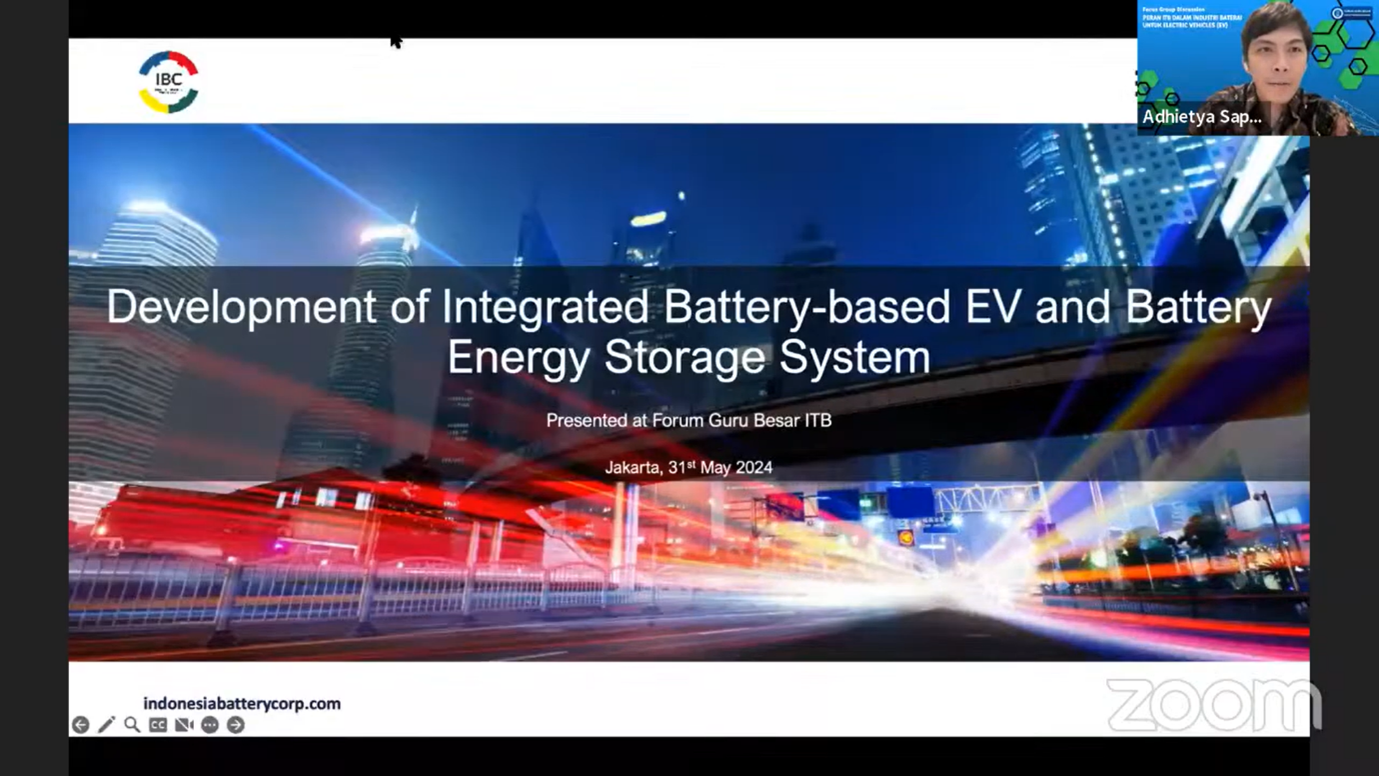FGD FGB ITB Discusses Mastery of Battery Technology for the Electric Vehicle Revolution
.png)
BANDUNG, itb.ac.id – The Professor’s Forum, Bandung Institute of Technology (FGB ITB) held a Focus Group Discussion (FGD) themed “ITB’s Role in the Battery Industry for Electric Vehicles (EV)”, Friday (31/5/2024).
Lecturer of the Faculty of Mechanical and Aerospace Engineering (FTMD) ITB, Dr. Bentang Arief Budiman, S.T., M.Eng., delivered a material entitled “Mastery of Battery Technology to Welcome the Electric Vehicle Revolution”.
He emphasized the urgency of holistic management of the automotive industry in Indonesia. “As a country with an economy that depends on logistics distribution and community movement, we must maximize the potential of the automotive industry,” he said.
He said that the potential of Indonesia’s automotive market continues to grow. The number of vehicles in Indonesia continues to increase every year. This is a great opportunity to develop the domestic automotive industry, including the EV battery industry.
However, currently Indonesia is still focusing on manufacturing and assembly. Research and development, especially in the field of design and prototypes, is still widely carried out abroad. the electric vehicle revolution can be a momentum for Indonesia to change this. “This revolution is driven by stricter emission regulations, increasing battery technology, and decreasing production and maintenance costs of electric vehicles,” he said.
.png)
He discussed a number of researches conducted at ITB related to electric vehicles batteries, including:
- Development of high-protection batteries: This research focuses on reducing the risk of thermal runaway and impact damage to batteries. Dr. Bentang and his team developed a homogenization method to increase the strength and rigidity of the battery, as well as testing the resistance of cylindrical batteries to impact loads;
- Development of battery cooling system: The ITB team designed air and liquid cooling system to maintain optimal battery temperature and minimize battery performance degradation;
- Electric vehicle integration technology: ITB has conducted research and development of various electric vehicle components, such as electric motors, inverters, and control systems, with a target of TKDN (Domestic Component Level) reaching 90%;
- Crashworthiness design: ITB conducts research and simulations to ensure the safety of electric vehicle batteries in the event of an accident. The focus is to protect the battery from impact and prevent short circuits;
- Development of future batteries: ITB is conducting research on Solid State Battery (SSB), a new generation of batteries that are safer and have higher energy efficiency. The ITB team also researched Functional Gradient Materials (FGM) technology to increase the mechanical resistance of SSB and minimize the risk of cracking.
Dr. Bentang said that collaboration between academics, industry, and the government is very important to encourage the development of the EV battery industry in Indonesia. “With support from various parties, we can maximize the potential of the EV battery industry and make Indonesia a key player in the global market,” he said.

Meanwhile, Adhietya Saputra, a representative from Indonesia Battery Corporation (IBC), discussed IBC’s strategic role in developing an integrated EV battery ecosystem in Indonesia. IBC was established with the aim of harnessing the potential of nickel resources in Indonesia as a key component in the EV battery industry.
“The concept is that we are downstreaming what we have. We are partnering, we develop, and we are committed to industrializing nickel to become battery products, as well as encouraging related industries in Indonesia,” he said.
He emphasized the importance of building an integrated supply chain, from mining to battery production. This is because most of the components are still imported.
.png)
In the face of global competition, especially from China, Adhietya revealed IBC’s strategy in building markets and building partnerships with Original Equipment Manufacturers (OEMs) to ensure the use of domestically produced batteries. “We see a great opportunity to become a leader in the EV battery market, at least in Southeast Asia. For this reason, we focus on binding OEMs so that they use our batteries,” he said.
IBC itself is a state-owned holding company formed to encourage the development of the integrated battery industry. The company has ambitions to produce up to 50 GWh of batteries, which are not only for export, but also to meet domestic needs.
“Indonesia has abundant mineral resources, not only for Lithium-ion, but also for Sodium-ion and copper. We need to develop the industry to make the most of this potential,” he said.
Although IBC focuses on downstream development, Adhietya recognizes the importance of upstream development, especially in terms of technology and infrastructure development. “The upstream development process takes a long time, about 4-5 years. However, we cannot only focus on downstream, we must also encourage the development of the electric vehicle industry itself,” he said.
He said that there needs to be support from various parties, including the government, universities, and investors, to maximize the potential of the EV battery industry in Indonesia. “The main challenges we face are human resources, infrastructure, and investment. We need collaboration to overcome this challenge,” he said.
This news is translated from itb.ac.id in Bahasa Indonesia with editing.
https://www.itb.ac.id/berita/fgd-fgb-itb-bahas-penguasaan-teknologi-baterai-untuk-revolusi-kendaraan-listrik/60865
